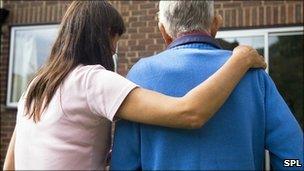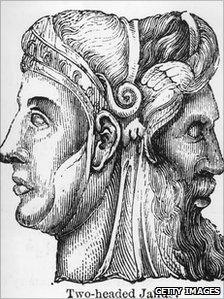Humanists call for new year resolutions to help others
- Published

The BHA wants people to consider helping others when they make their resolutions
The British Humanist Association is urging people who are making new year resolutions to think about doing something extra to help others.
The BHA says that making a commitment to help others, as well as yourself, can help beat the January blues, as well as making society more cohesive.
Its new Resolution Revolution campaign and accompanying website aims to change attitudes about personal improvement.
The charity says everyone, regardless of faith, could carry out good deeds.
The organisation says its new website is intended to give advice and support to anyone getting involved in the Resolution Revolution, and says research backs up their claims.
There people can find out how to make personal resolutions to change their behaviour that are realistic, and thus more likely to succeed.
They are also being encouraged to sign up to a "social resolution", such as helping a neighbour, getting involved in a community organisation, or some other way of giving their own time.
Practical measures
The BHA's Joanne Knowles, who is leading the project, said that carrying out helpful activities for others can bring real personal rewards for individuals as well.
"Getting involved in things that are important to people is the best way forward and means their resolutions are more likely to be successful.
"Do something practical - it's not really about just giving a financial donation to a good cause," she said.
On the website people can make a public pledge about their goals, and find tips on how to keep them.
Prof John Norcross, from the University of Scranton, Pennsylvania, USA, has spent 30 years studying how individuals make changes in their lives.
He says that helping others not only results in greater personal well-being, but brings the concept of new year resolutions back to their ancient origin.

In Roman times worshippers would make promises to Janus on behalf of others
"In Roman times, worshippers would make 'good conduct' resolutions to the god Janus, but they were often made on behalf of somebody else.
"It was about being a better person and a better citizen, and had a broader, societal meaning."
The BHA, which campaigns for "a world without religious privilege" denies that its campaign is part of an effort to prove that good deeds are not the sole preserve of religious organisations or people with faith.
The organisation's chief executive Andrew Copson believes that the new year celebrations are a secular occasion, shared by many communities both with or without religious beliefs.
"One of the points that Resolution Revolution makes is that being 'good' is not confined to any one philosophy or religion or non-religious belief.
"It's something that we all do, we're all part of the same society and we do good on a daily basis.
"This is a way of celebrating that and encouraging people to do it in a more planned way that will empower them and make them feel good."
The charity hopes that schools will also get involved and has provided materials for children to use, which do not mention the BHA or its aims.
According to research published in September 2010 by the Charities Aid Foundation, 29% of people in the UK have volunteered their time in month preceding the survey, compared to 61% in Turkmenistan, which topped the poll.
The World Giving Index, external, used data primarily taken from Gallup's WorldView World Poll which sampled individuals living in urban centres in 153 countries.